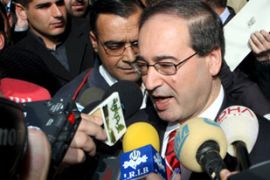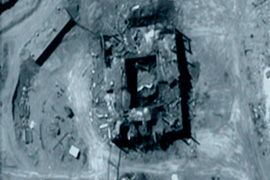‘Uranium found’ at Syrian site
Diplomats say site bombed last year by Israel needs further investigation.

Nuclear link
The diplomats, who demanded anonymity because their information was confidential, said the uranium was processed and not in raw form, suggesting some kind of nuclear link.
But one of the diplomats said the uranium finding itself was significant only in the context of other traces found in the oil or air samples taken by International Atomic Energy Agency (IAEA) experts during their visit to the site in June.
Syria has a rudimentary declared nuclear programme revolving around research and the production of isotopes for medical and agricultural uses.
But the diplomats said the uranium and the other components found on the environmental swipes “tell a story” worth investigating.
The findings will reportedly figure in a report on Syria that will be presented to the IAEA’s 35-nation board next week ahead of a scheduled two-day meeting starting on November 24.
IAEA investigation
Diplomats already said late last month that air and soil samples taken at the site bombed last year by Israeli warplanes had turned up traces of elements that the agency felt needed to be followed up on.
 |
| The 2007 Israeli air strike destroyed what the US said was a nuclear reactor [AFP] |
The findings are important after months of uncertainty about the status of the investigation by the nuclear watchdog.
Preliminary results of the environmental samples collected from the site by an IAEA team were inconclusive, adding weight to Syrian assertions that no trips beyond the initial IAEA visit in June were necessary.
The United States says the facility hit by Israeli warplanes in September 2007 was a nearly completed reactor that, when on line, could produce plutonium, a pathway to nuclear arms.
But Damascus denies running a covert programme.
Ibrahim Othman, Syria’s nuclear chief, has said his country would wait for final environmental results before deciding how to respond to repeated IAEA requests for follow-up visits to the one in June, when the samples were collected.
Syria fears the IAEA probe could lead to a massive investigation similar to the probe Iran has been subjected to for more than five years – and to related fallout.
Iran is under UN sanctions because of its refusal to heed United Nations security council demands to curb its nuclear activities.